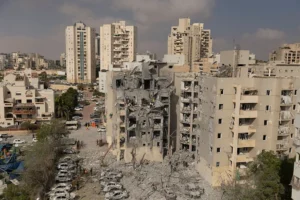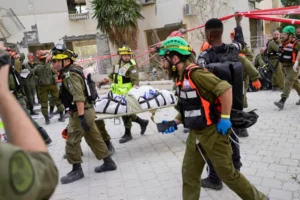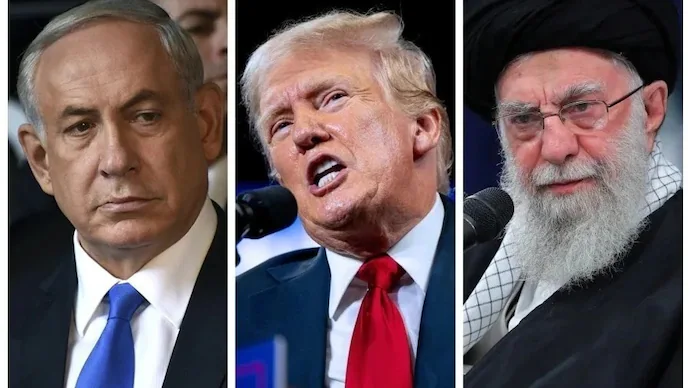Qalam Times News Network

Emergency and rescue responders work at the rubble of a building after a ballistic missile fired from Iran struck a building in Beer Sheva, Israel, shortly before Iran publicly announced a ceasefire on June 24, 2025
June 24, 2025 – Qalam Times Desk
A brief and fragile ceasefire between Israel and Iran, brokered by U.S. President Donald Trump, collapsed within hours of being declared, plunging the region back into uncertainty and raising global alarm over the escalation of one of the most dangerous conflicts in recent memory.
Ceasefire Crumbles After Waves of Missile Attacks


People evacuating a building next to a site struck by an Iranian missile strike in Beersheba, Israel, on Tuesday, June 24, 2025 [Bernat Armangue/AP Photo]
Calm had begun to return early Tuesday following six waves of missile launches from Iran that reportedly ceased just before a 07:30 GMT deadline announced by President Trump. Iranian Foreign Minister Abbas Araghchi confirmed the strikes, calling them a final act of “punishment” for what Iran described as Israeli aggression.
“Operations by our brave armed forces continued until the final minute,” Araghchi stated via social media. Several casualties were reported by both emergency responders and the Israeli military. Soon after, Israeli citizens were instructed they could leave missile shelters, with no further missile launches reported at that time.
But the apparent calm did not last long.
Renewed Strikes and Accusations
By Tuesday afternoon, the Israeli government accused Iran of breaching the ceasefire by launching additional missiles. The Israeli Defense Forces (IDF) responded with airstrikes deep inside Iranian territory, targeting what they described as regime strongholds in Tehran.
Defense Minister Israel Katz announced the new offensive, stating, “We will respond decisively to Iran’s blatant violation of the ceasefire.”
Israel’s military confirmed that sirens had sounded in northern parts of the country around 3:30 a.m. ET, allegedly due to Iranian missile fire. While Iranian state media denied any such action after the ceasefire began, it countered by accusing Israel of launching three unauthorized strikes across Iranian territory earlier in the morning.
Iranian officials dismissed the Israeli claims as a pretext for further aggression and warned of a “stronger retaliation” should the attacks continue.
A War on Multiple Fronts
The backdrop of this renewed violence includes rising domestic pressure on Israeli Prime Minister Benjamin Netanyahu. After declaring a ceasefire with Iran, opposition leaders urged him to extend the truce to Gaza and bring an end to the ongoing 20-month war with Hamas.
“Now turn to Gaza—end the war, bring the hostages home,” urged opposition figure Yair Lapid.
However, criticism from within Netanyahu’s own Likud party revealed deep divisions. Member of Knesset Dan Illouz denounced any peace efforts with Iran, declaring, “This is not a regime to negotiate with—it is one that must be dismantled.”
Nuclear Tensions Simmer Beneath the Surface
The initial Israeli strikes on June 13 were justified on the grounds that Iran was nearing nuclear weapon capability. U.S. strikes quickly followed. The International Atomic Energy Agency (IAEA) on Monday requested immediate access to Iranian nuclear facilities, amid speculation that Iran had moved enriched uranium stocks prior to the attacks on its key facilities in Fordow, Isfahan, and Natanz.
Mohammad Eslami, head of Iran’s Atomic Energy Organization, acknowledged the damage and confirmed that steps were underway to restore operations with minimal disruption.
Trump’s Fury Over Renewed Fighting
President Trump, who had personally pushed for the ceasefire and celebrated its announcement just hours earlier, reacted angrily to the escalation.
Speaking to reporters, Trump reportedly said, “I’m really unhappy with Iran—and honestly, I’m not happy with Israel either. They don’t know what the f— they’re doing.”
In a dramatic appeal on his social platform Truth Social, Trump wrote:
DO NOT DROP THOSE BOMBS. IF YOU DO, IT IS A MAJOR VIOLATION. BRING YOUR PILOTS HOME, NOW!”**
Future Uncertain
The unraveling of the ceasefire has left the region teetering on the edge of a broader conflict. While both sides had initially signaled a willingness to pause hostilities, underlying mistrust, political pressure, and strategic posturing have once again brought them to the brink.
With Iran vowing to retaliate and Israel determined to act against any perceived threat, the road ahead appears increasingly perilous—for the region and the world.







